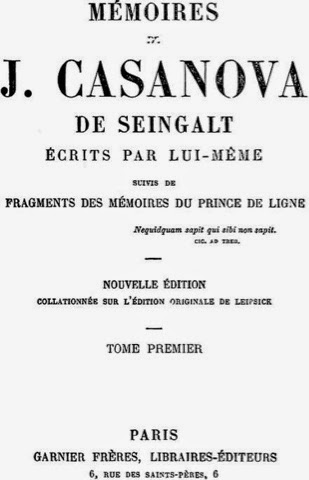The memoirs open with:
"I begin by declaring to my reader that, by everything good or bad that I have done throughout my life, I am sure that I have earned merit or incurred guilt, and that hence I must consider myself a free agent. ... Despite an excellent moral foundation, the inevitable fruit of the divine principles which were rooted in my heart, I was all my life the victim of my senses; I have delighted in going astray and I have constantly lived in error, with no other consolation than that of knowing I have erred. ... My follies are the follies of youth. You will see that I laugh at them, and if you are kind you will laugh at them with me."
Giacomo Girolamo Casanova (2 April 1725 – 4 June 1798) was an Italian adventurer and author from the Republic of Venice. His autobiography, Histoire de ma vie (Story of My Life), is regarded as one of the most authentic sources of the customs and norms of European social life during the 18th century.
As was not uncommon at the time, Casanova often used pseudonyms, the most frequent being Chevalier de Seingalt (pronounced Saint-Galle as in French). He also published abundantly in French under the name Jacques Casanova de Seingalt.
He has become so famous for his often complicated and elaborate affairs with women that his name is now synonymous with "womanizer". He associated with European royalty, popes and cardinals, along with luminaries such as Voltaire, Goethe and Mozart. He spent his last years in Bohemia as a librarian in Count Waldstein's household, where he also wrote the story of his life.
The main authority for Casanova's life is his Mémoires (12 vols., Leipzig, 1826-38), which were written at Dux. They are clever, well written and, above all, cynical, and interesting as a trustworthy picture of the morals and manners of the times. Among Casanova's other works may be mentioned Confutazione della storia del governo Veneto d'Amelot de la Houssaye (Amsterdam, 1769), an attempt to ingratiate himself with the Venetian government; and the Histoire of his escape from prison (Leipzig, 1788).
Book english (complete)
Book spanish


No comments:
Post a Comment